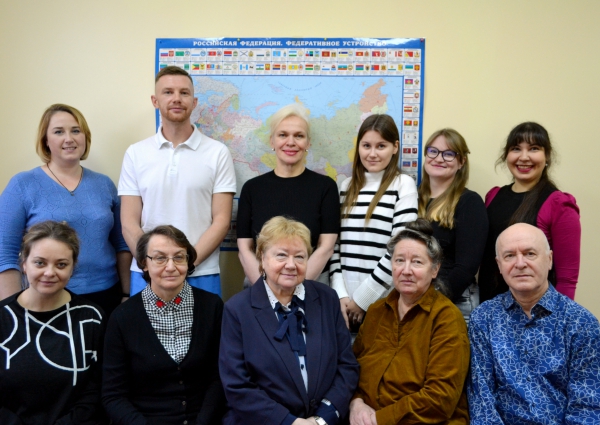Laboratory of Molecular Epidemiology of Viral Infections
Print versionHead of the laboratory - Doctor of BiologicalSciences (DSci. in Biology), Professor, Merited worker of health services of the Russian Federation, Companoin of the Order of Pirogov
Nadezhda A.Novikova

The laboratory of Molecular Epidemiology of Viral Infections was established in 1992. Currently, the Volga regional scientific and methodological center for the study of enterovirus infections has been operating on the basis of the laboratory since 2007 and the reference center for the monitoring of enterovirus infections since 2008.
Directions of activities:
-
Study of genetic and antigen diversity of pathogens causing acute intestinal infections based on PCR typing, fragment and whole genome sequencing, nucleotide sequence studies and phylogenetic analysis.
-
Identification and characterization of epidemic variants of rotaviruses and noroviruses, study of their molecular evolution and analysis of internal mechanisms of epidemic process development.
-
Identification and study of biological, molecular and genetic characteristics of pathogens causing enterovirus infections, including new types of enteroviruses and those detected in atypical clinical forms of enterovirus infection. Analysis of epidemiological risks associated with the introduction and spread of epidemic variants of enteroviruses in the territory of the Russian Federation.
-
Improvement of the methodology of molecular epidemiological monitoring of enterovirus infections and viral acute intestinal infections.
-
Providing advisory, methodological and practical assistance to bodies and institutions of Rospotrebnadzor and medical organizations in conducting laboratory research and monitoring enterovirus infections.
Laboratory achievements:
- Laboratory methods for detection and genotyping of intestinal viruses have been developed: electrophoretic typing of rotavirus RNA in PAAG, determination of the G and P genotype of rotaviruses, genogroups of entero- and caliciviruses using RT-PCR, which are protected by copyright certificates and patents, as well as identification of the type and strain characteristics of viruses by genome sequencing. More than 2,000 nucleotide sequences of the genome of intestinal viruses have been deposited in the international bank.
- A molecular genetic characteristic of rotavirus A strains has been given and their antigenic and genetic diversity has been shown. Based on all segments of the genome and phylogeographic reconstruction, a reassortant variant of the G3P genotype [8] has been studied, which was formed in Southeast Asia and was brought to the territory of Russia. Evolutionary changes in the VP4 and VP7 genes in rotaviruses of the G1P[8], G4P[8], and G9P[8] genotypes are shown. Rare genetic variants (G3P[9], G6P[9], G12P[8]) are identified and analyzed. Rotavirus variants of different genotypes identified in Russia are compared with vaccine strains in immunologically significant regions of the outer capsid proteins. The obtained knowledge is reported at all-Russian and international conferences.
- Genotypes and genovariants of noroviruses circulating among the population of Nizhny Novgorod and the Nizhny Novgorod region over the past two decades are determined, a change in epidemic variants of noroviruses of the GII.4 genotype in the studied territory is shown, synchronized with global processes in viral populations. Periodic short-term activation of circulation of non-GII.4 genotypes (GII.2[P16], GII.3[P12], GII.7[P7], GII.17[P17]) has been recorded, usually accompanied by an increase in the incidence of norovirus infection. Based on genotyping, it has been established that intertype and intervariant recombination is currently one of the main mechanisms of norovirus evolution. Guidelines and a database of nucleotide sequences have been developed to optimize molecular monitoring of norovirus circulation as part of genomic epidemiological surveillance of norovirus infection. A methodology for typing enteroviruses using molecular genetic research methods has been developed. Based on the analysis of the established nucleotide sequences of enterovirus genome fragments identified in the territory of 70 subjects of 8 federal districts of the Russian Federation. The landscape of non-polio enteroviruses circulating among the population of Russia is characterized, represented by more than 50 types. More than 800 fragments of the genome of enteroviruses are deposited in the international bank of nucleotide sequences. The etiological structure of enteroviral meningitis and enteroviral exanthematic diseases in the Russian Federation is characterized. The molecular epidemiology of enteroviruses that caused increases in the incidence of enteroviral meningitis and enterovirus infection in Russia as a whole and in certain territories (ECHO30, ECHO9, Coxsackie A6, Enterovirus A71, etc.) was studied.
- Methods for detection and genotyping of human parechoviruses causing diseases similar in clinical manifestations to enterovirus infection were developed. For the first time, the wide circulation of human parechoviruses among the population of Russia was demonstrated, and their typical and genetic diversity was studied.
Prospects
- In-depth molecular genetic characterization of known and new enteral viruses using whole genome sequencing.
- Studying the pathogenicity determinants of the enteric viruses, the evolution of the genome and antigenic properties.

Phone: +7(831) 469-79-12 Nadezhda A.Novikova
E-mail: mevirfc@rambler.ru
Address: 603950, Nizhny Novgorod, Malaya Yamskaya st., 71, 3th floor.





